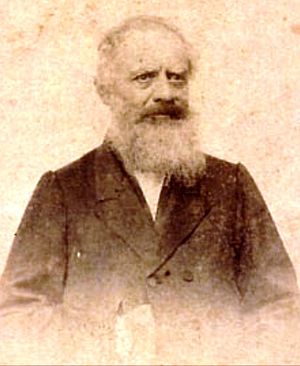José Rufino Echenique facts for kids
Quick facts for kids
José Rufino Echenique Benavente
|
|
|---|---|
 |
|
| 12th President of Peru | |
| In office April 20, 1851 – January 5, 1855 |
|
| Preceded by | Ramón Castilla |
| Succeeded by | Ramón Castilla |
| Personal details | |
| Born | November 16, 1808 Puno, Peru |
| Died | June 16, 1887 (aged 78) Lima, Peru |
| Military service | |
| Allegiance | |
| Branch/service | Peruvian Army |
| Years of service | 1821–1854 |
| Rank | Brigadier general |
| Battles/wars | Peruvian War of Independence
1828 Peruvian–Bolivian War
1843–44 Peruvian Civil War
|
José Rufino Echenique Benavente (born November 16, 1808 – died June 16, 1887) was an important Peruvian leader. He served as the 12th President of Peru from 1851 to 1855. Before becoming president, he was a brave soldier who fought in many battles for his country.
Contents
Early Life and Military Career
José Rufino Echenique was born in Puno, Peru, on November 16, 1808. He joined the Peruvian Army at a young age. He fought in the Peruvian War of Independence, which helped Peru become a free country.
He also took part in other important conflicts. These included the 1828 Peruvian–Bolivian War and the Gran Colombia–Peru War. He became a Brigadier general, a high rank in the army.
Becoming President of Peru
In 1851, José Rufino Echenique ran for president. He won the elections and took over from Ramón Castilla. Castilla was another famous Peruvian leader. Echenique's time as president lasted for about four years.
Key Actions as President
During his presidency, Echenique made several big changes for Peru.
- New Laws: He helped create the first official civil laws for Peru. These laws helped organize how people lived and worked together.
- Ending Slavery: One of his most important actions was abolishing slavery. This meant that enslaved people in Peru became free.
- Building Railroads: He also oversaw the completion of the Tacna-Arica railroad. This railway was important for travel and trade in the region.
Later Life and Overthrow
In 1855, Echenique's presidency came to an end. He was overthrown by a liberal revolution. This revolution was led by his predecessor, Ramón Castilla.
After his time as president, Echenique continued to be active in Peruvian politics. He served as the President of the Chamber of Deputies in 1864. Later, he was the President of the Senate from 1868 to 1871.
His son, Juan Martín Echenique, also became involved in Peruvian politics.
Connection to Paul Gauguin
An interesting fact about José Rufino Echenique is his connection to the famous painter Paul Gauguin. Gauguin and his mother lived with Echenique in his presidential home in Lima. This was from 1849 to 1854, during Gauguin's childhood.
See also
 In Spanish: José Rufino Echenique para niños
In Spanish: José Rufino Echenique para niños
 | George Robert Carruthers |
 | Patricia Bath |
 | Jan Ernst Matzeliger |
 | Alexander Miles |

